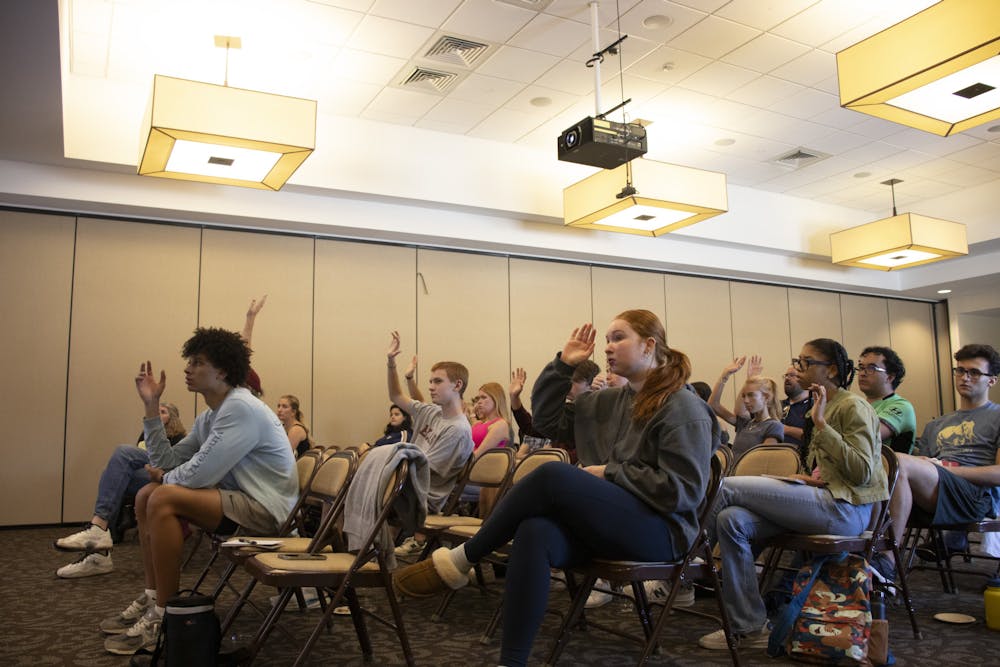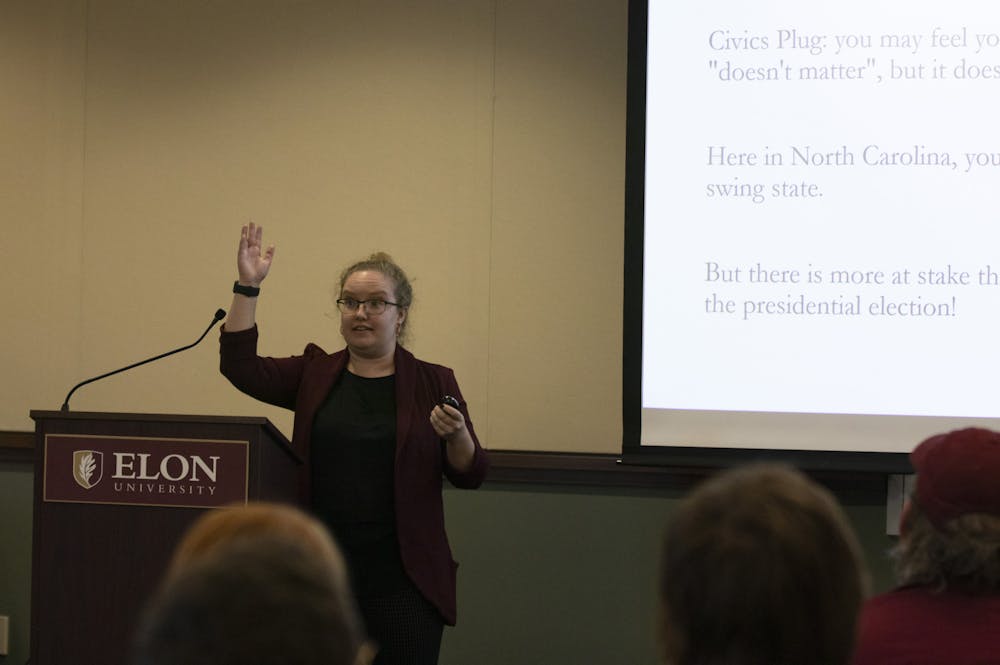Maggie Macdonald ’15 spoke at Elon University on Oct. 23 as part of the Data Nexus Power of Women in Data series to discuss the role of district boundaries and social media in elections. The assistant professor of political science at the University of Kentucky has research experience in congressional campaigns and elections, specifically concerning strategic online political communication and campaign finances.
Data Nexus is Elon’s Hub for data competency, particularly designed to prepare students to understand the role of data and data analysis in society. The theme of Data Nexus this year is “Data in Our Local Community,” so Macdonald focused much of her talk on local elections and issues relevant to North Carolina.
“Where we live shapes the politics that we experience. It shapes who we will see on our ballot, the offices and the people who are there,” Macdonald said during the event.
North Carolina, like most states, redistricted after the 2020 census to ensure equitable representation in state and national legislatures. This effort sparked a yearslong series of proposed and rejected district maps and accusations of gerrymandering.
“It is very difficult to understand the Electoral College and federalism and how to vote and to know what on earth the 20 different things on your ballot are,” Macdonald said. “So when, like in North Carolina, there are very intense, drawn out legal battles, this can just add confusion and uncertainty for the voters — and could mean that people either opt to not vote at all, or when they do vote, they just feel less informed.”
With the increase of polarization in politics, state decisions are becoming more important. Laws surrounding abortion, school curriculums and immigration issues have fallen on state governments after failed compromises in the federal government. Macdonald said this is where districts and locally elected representatives play a key role.
“If you want your preferences to be carried out in legislatures, then you need to have a sense of who is going to be in power and to be able to advocate for your preferences to them,” Macdonald said.

Students participate in a show of hands on Oct. 23 in upstairs Lakeside during Elon alumna Maggie Macdonald's Data Nexus lecture.
Another major factor in the information gap voters face is related to social media, according to Macdonald. Posts with negative and inflammatory language tend to receive more views, which may seem counterintuitive to constituents, but helps candidates effectively reach a wider audience. Macdonald said social media has changed how voters learn about their candidates.
“It has shaped, I think, people's perceptions of politics that now the only politics that people see are negative and polarizing, because those are the issues that work well on social media,” Macdonald told Elon News Network. “This has put a lot of people off of politics, or at least made them feel less good about politics.”
Crista Arangala, director of Data Nexus and Elon mathematics professor, said she wants to expose students to data within their future careers.
“Data is really meaningless without context,” Aranagala said. “And so we try to bring in speakers from a variety of disciplines. Within this particular semester, politics is a big deal.”
This message resonated with audience member Marlie Barhorst, a freshman Data Analytics Scholar.
“Social media and politics is kind of a new thing that's evolving, and so getting a professional's talk on something that's relatively new and how that's impacted this new political scene was interesting to me,” Barhorst said.
A major way politicians reach constituents is through mainstream social media platforms such as X — formerly Twitter — Facebook, Instagram, YouTube and TikTok. While X generally appeals to other politicians and Facebook is most effective for older adults, Instagram, YouTube and TikTok tend to be more popular with younger voters. Recently, “alt tech” platforms such as Truth Social and Parler have emerged as forums with fewer content moderation policies. These platforms have much smaller audiences and lean strongly right on the political spectrum.
“It is something that politicians have multiple designated staff to run, which means that they are spending less money on their policy staff, because you get a pool of money and you allocate how you spend it, and so they have spent more money on communications,” Macdonald said during the event. “This shows that they value it, but it does mean that they have less policy expertise on hand.”
To an audience of mostly young, new voters, Macdonald’s advice on how to begin addressing these issues was clear: vote. As a professor, Macdonald said many of her students often feel hopeless about having their voices heard on the ballot.
“Many of my students feel that their vote doesn’t matter,” Macdonald said. “I just want to highlight that your vote does matter, and I hope that more of you vote than not vote. Particularly here.”


